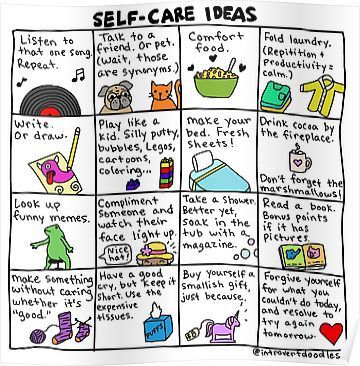Self-care tips and tricks

A drawing showcasing different types of self-care. Photo credit: Introvert Doodles at RedBubble.
With holiday festivities such as thanksgiving dinners and Christmas shopping coming up, students tend to forget about ourselves and that we too need some self-care.
When we think of self-care, the first thing that comes to people’s minds may be massages and face masks. And although it can be those things, self-care is basically any way of checking in with yourself and making sure you are emotionally and physically well. While this may seem obvious, high schoolers across the nation tend to put unnecessary stress on themselves, damaging their self-esteem and overall well-being.
According to Merriam-Websters’ definition of self-care, self-care is, “the practice of taking action to preserve or improve one’s health.” It’s taking account of every aspect: mentally, physically, spiritually, and emotionally.
Not sure where to start? Here are nine ways to practice self-care:
- Do something different:
Do something new, that is out of the ordinary, something you wouldn’t typically do every day. Bake a cake, take a bike ride downtown, or even read a new book. Whatever makes you smile, laugh, or generally feel better. Don’t hesitate to take control and have fun.
- Unplug:
Unplug from the world for a little bit by taking a rest from everything electronic. Unplugging digitally can be a great way to create a positive state of mind. For instance, Instagram can actually cause greater harm than good as people tend to compare themselves to others. Instead, empower yourself to focus on your well-being and the beauty of everything by removing yourself from the outside world for a bit. Go out and see the world with your own eyes.
- Talk to someone:
Having a shoulder to lean on in times of struggle is an important comfort for many people.
Being with family and friends lifts your spirit because you are in the company of those who make you smile. Being with someone with whom you have a superb connection, and with whom you can about anything, brings more positivity to your life.
- Let go of unwanted things:

Some of the accessibly downloadable apps that assist with self-care.
Photo Credit: Janessa Gutierrez ’20
Throughout our life, we believe that we must keep ahold of things that we should let go of. It could be physical or mental things. Letting go doesn’t have to be of the past or things you may have done or something that has been done to you, but it can also be letting go of the toxic things in your life, for example; toxic relationships. Although it can be difficult to distance yourself from those who are toxic in your life, interacting with them, as they constantly cut you down or try and manipulate you to their own advantage can take a huge toll on your own mental health.
- Help someone out:
Now we may not think it can change our own mood and the way we go about our day but helping someone in need, even with the smallest gestures make the biggest difference in someone’s day. Holding a door open or helping them carry their bags not only benefits our mood, but it lifts the spirit of another too!
- Listen to some tunes:
Scientists have discovered that listening to music can have a great effect on our bodies and minds, causing our spirit and mood to rise to a more positive level. Classical music can benefit your health, slowing the heart rate, lowering blood pressure and decrease the levels of stress hormones. Upbeat music can make you feel more cheerful and positive about life and everything surrounding it. Different types of music can make you feel different types of ways. Music is extremely effective for relaxation and handling stress.
- Write out your thoughts:
For me, writing is a great way to relieve the stress that weighs on my shoulders each day. Writing allows me to unwind, pushing out the thoughts that I may have run through my head throughout each day. Writing in a notebook can help you extinguish the negative thoughts or unpleasant things you have encountered that day.
- Getting a good nights’ sleep:
According to the Nationwide Children’s Hospital, statistics that show teenagers are not getting enough sleep. Teens are getting an average of between seven and seven and a half hours per night. However, for a healthy amount, teenagers need anywhere between nine and nine and a half hours. Now, it may seem impossible to strive sufficient sleep, but you can improve your sleep if you: turn off electronics five minutes before laying down, avoid caffeine, and try to keep a regular sleep schedule.



